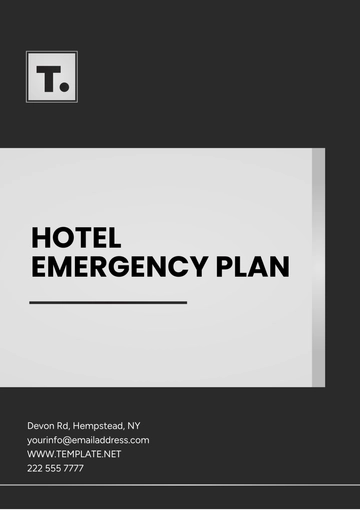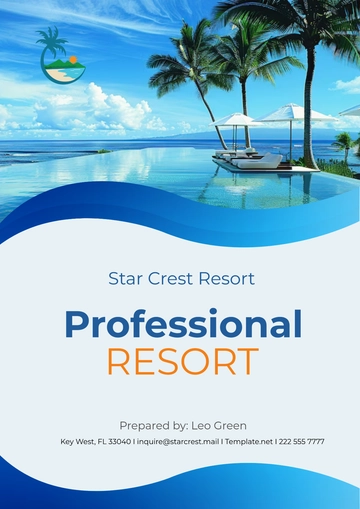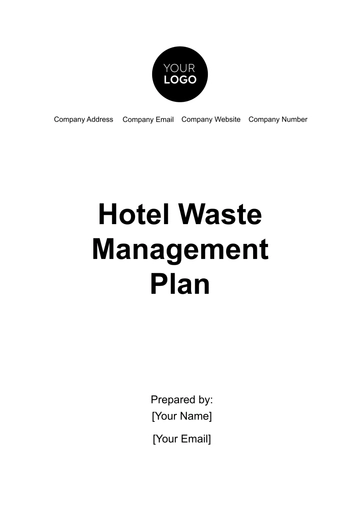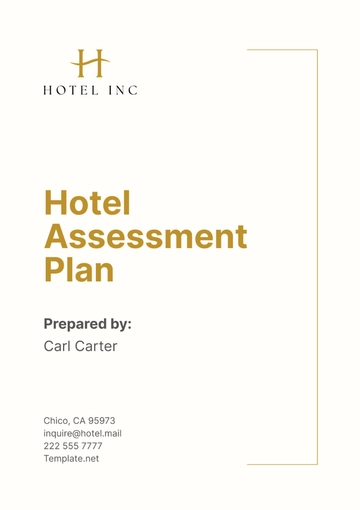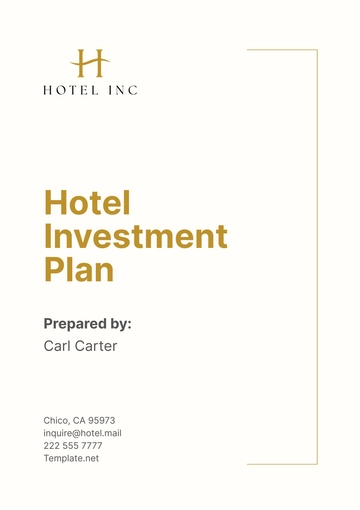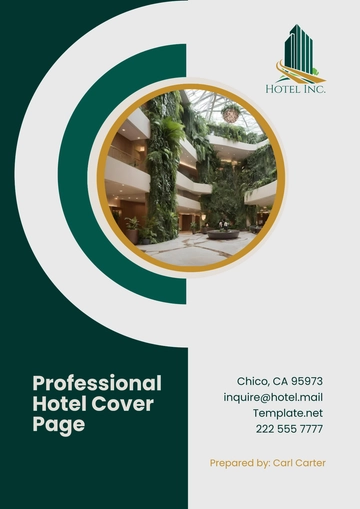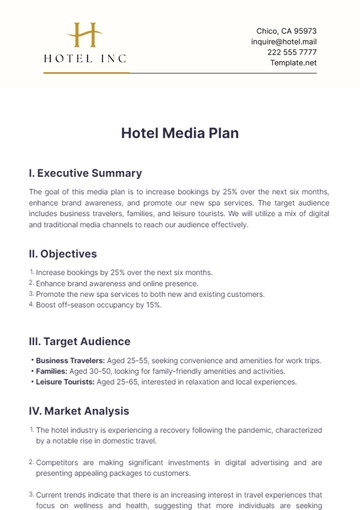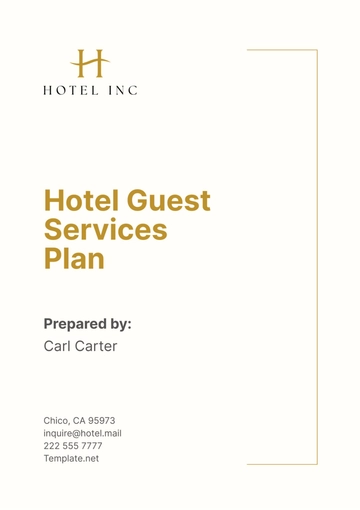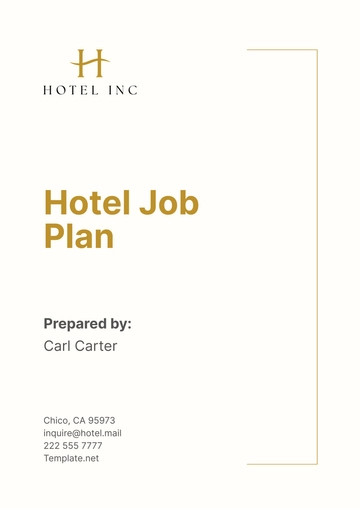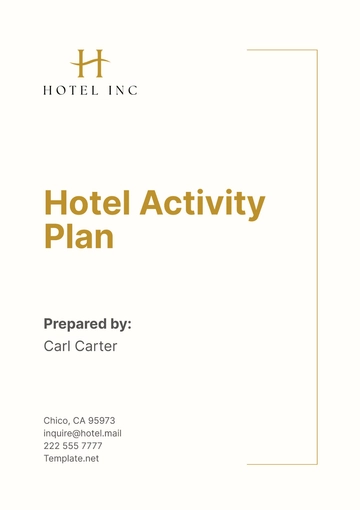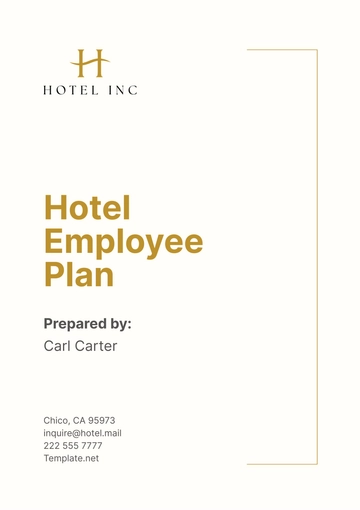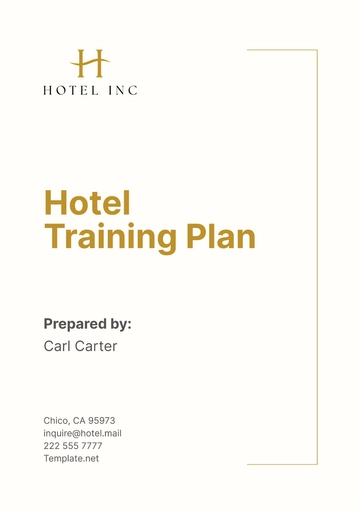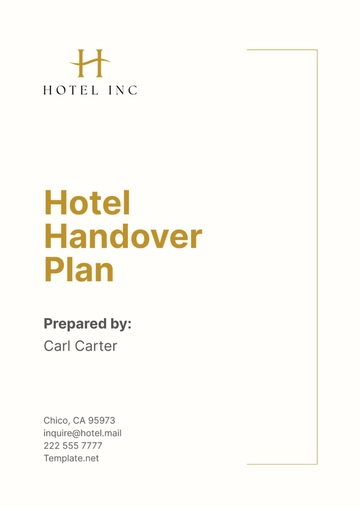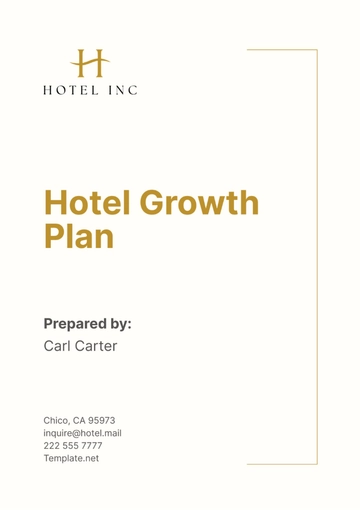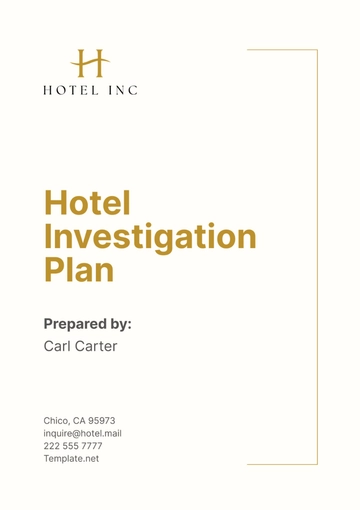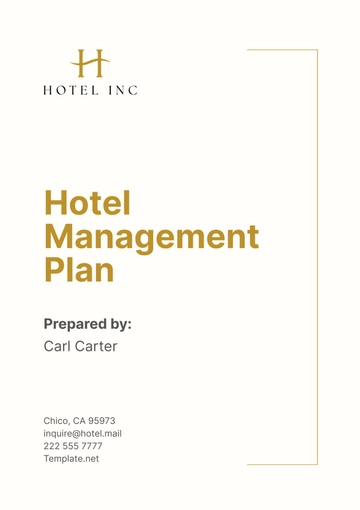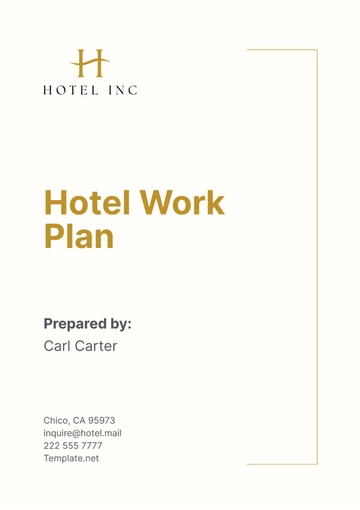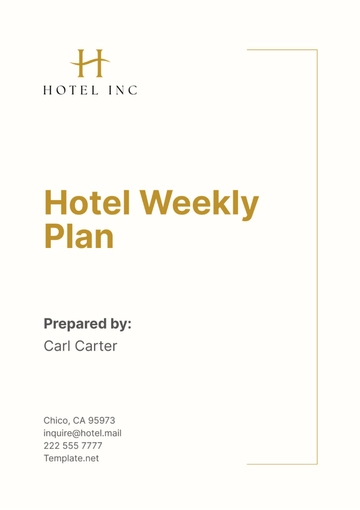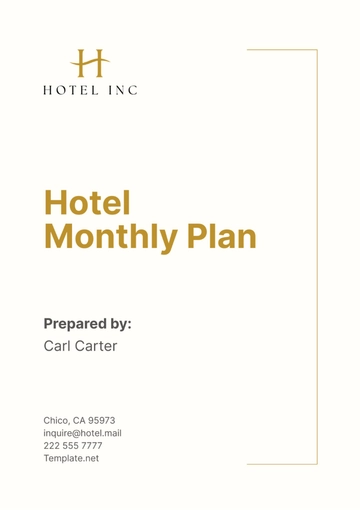Free Hotel Training Plan
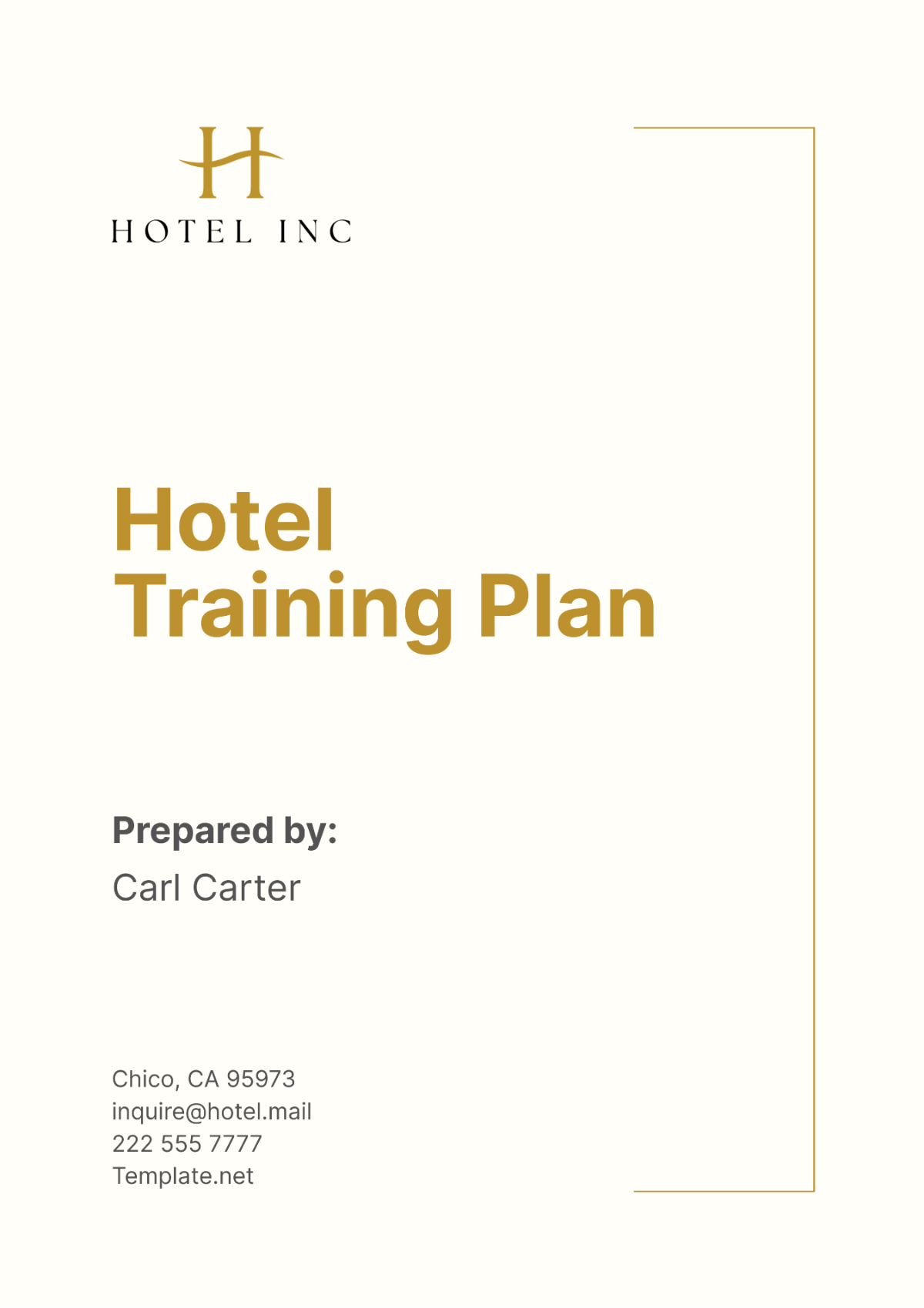
I. Introduction
In the competitive hospitality industry, providing exceptional service is crucial for success. This Hotel Training Guide is designed to equip employees with the essential skills and knowledge needed to ensure guest satisfaction and operational efficiency. The purpose of this guide is to familiarize staff with hotel policies, enhance customer service skills, ensure compliance with safety regulations, promote teamwork, and support professional growth. Through comprehensive training, we aim to uphold the highest standards of excellence in all aspects of hotel operations.
A. Purpose
This training plan is designed to equip hotel employees with the necessary skills and knowledge to deliver exceptional service, ensuring guest satisfaction and operational efficiency.
B. Objectives
The main objectives of this training plan are:
To familiarize employees with hotel policies and procedures.
To develop excellent customer service skills.
To ensure adherence to safety and health regulations.
To enhance teamwork and communication among staff.
To provide opportunities for professional growth and development.
II. Training Program Structure
Our comprehensive training program is structured to ensure that all hotel employees are well-prepared to deliver exceptional service. The program encompasses an orientation phase to introduce new hires to our company culture, departmental training tailored to specific roles, extensive safety and compliance instruction, and focused training on customer service excellence. By addressing these key areas, we aim to create a cohesive and knowledgeable team capable of meeting the highest standards in hospitality.
A. Orientation
The orientation phase is the foundation of our training program, designed to seamlessly integrate new employees into [Your Company Name]. During this phase, new hires will be introduced to our organizational culture, core values, mission, and vision. They will learn about the history of the hotel, its unique attributes, and the expectations for their roles. This phase also includes a comprehensive overview of the hotel's policies and procedures, including:
Attendance and Punctuality: Understanding the importance of being on time and maintaining consistent attendance.
Dress Code: Guidelines on appropriate attire and grooming standards.
Professional Conduct: Expectations for behavior and interaction with guests and colleagues.
Additionally, new employees will be acquainted with their colleagues and given a tour of the facilities to familiarize them with the workplace environment. Orientation sets the stage for a positive and productive employment experience, ensuring that every team member understands their role in contributing to the hotel's success.
B. Departmental Training
Departmental training is a crucial component of our training program, providing specialized instruction tailored to the specific needs of various hotel departments. This section ensures that employees in departments such as Front Desk, Housekeeping, Food and Beverage, and Maintenance receive the targeted training necessary for their roles.
Front Desk
Guest Check-In/Check-Out Procedures: Efficient and friendly processing of arrivals and departures.
Reservation Management: Handling bookings, cancellations, and modifications.
Guest Inquiries and Complaints: Addressing questions, resolving issues, and ensuring guest satisfaction.
Housekeeping
Cleaning Protocols: Standard operating procedures for room and common area cleaning.
Room Preparation Standards: Ensuring rooms are welcoming and up to hotel standards.
Inventory Management: Tracking and replenishing cleaning supplies and linens.
Food and Beverage
Food Safety: Adhering to health regulations and proper food handling practices.
Menu Knowledge: Understanding menu items to answer guest questions and make recommendations.
Service Techniques: Providing excellent table service and managing guest orders.
Maintenance
Routine Upkeep: Performing regular maintenance tasks to keep the property in top condition.
Emergency Repairs: Responding promptly to maintenance issues.
Equipment Handling: Safe operation of maintenance tools and machinery.
Departmental training ensures that each employee has the skills and knowledge to perform their duties effectively, contributing to overall hotel operations.
C. Safety and Compliance
Ensuring the safety and compliance of our hotel operations is a top priority. This section of the training program is dedicated to educating employees on safety protocols, emergency procedures, and hotel compliance standards.
Safety Protocols
Fire Safety: Training on fire prevention, use of extinguishers, and evacuation routes.
Use of Safety Equipment: Proper handling of personal protective equipment (PPE).
Emergency Procedures
Evacuation Routes: Knowing the quickest and safest ways to exit the building.
Emergency Contacts: Key contacts and communication during emergencies.
Compliance Standards
Health and Safety Laws: Understanding local, state, and federal regulations.
Labor Laws: Knowledge of employee rights and employer responsibilities.
Industry-Specific Standards: Adherence to hospitality industry best practices and standards.
By prioritizing safety and compliance, we aim to protect our guests, employees, and property, ensuring a secure and legally compliant operation.
D. Customer Service Excellence
Outstanding customer service is at the heart of our hotel's success. This section of the training program focuses on developing exceptional customer service skills to enhance guest satisfaction and loyalty.
Effective Communication
Active Listening: Techniques to understand guest needs and concerns.
Clear and Courteous Interaction: Speaking politely and providing accurate information.
Conflict Resolution
Handling Complaints: Strategies for resolving guest issues calmly and efficiently.
De-escalation Techniques: Managing tense situations to prevent escalation.
Personalized Service
Anticipating Guest Needs: Proactively addressing potential guest requirements.
Creating Memorable Experiences: Going above and beyond to delight guests.
Positive Attitude and Professionalism
Maintaining a Positive Demeanor: Keeping a friendly and helpful attitude at all times.
Attention to Detail: Ensuring all aspects of service meet high standards.
III. Training Modules
Our training modules are designed to provide comprehensive, role-specific education to ensure that every employee is equipped with the knowledge and skills necessary to excel in their position. The modules cover a wide range of topics, from basic job functions to advanced service techniques, ensuring a well-rounded training experience.
A. Front Desk Operations
The Front Desk Operations module trains employees in the essential functions of guest services, administrative duties, and customer interaction, ensuring a seamless experience for our guests from check-in to check-out.
Guest Services
Check-In/Check-Out Procedures: Step-by-step guide on managing guest arrivals and departures, including system operations and payment processing.
Reservation Management: Training on handling bookings, cancellations, modifications, and special requests using the hotel’s reservation system.
Customer Interaction
Handling Inquiries: Techniques for answering guest questions and providing accurate information.
Complaint Resolution: Strategies for addressing and resolving guest issues, ensuring a positive outcome.
Administrative Duties
Report Generation: Creating daily, weekly, and monthly reports on occupancy, revenue, and other key metrics.
Communication Logs: Maintaining accurate records of guest interactions and internal communications.
B. Housekeeping Excellence
The Housekeeping Excellence module focuses on maintaining high cleanliness standards, efficient inventory management, and professional guest interaction, ensuring a spotless and welcoming environment for our guests.
Cleaning Protocols
Room Cleaning Standards: Detailed procedures for cleaning guest rooms, including bed making, bathroom sanitization, and dusting.
Public Area Maintenance: Ensuring cleanliness and orderliness in lobbies, hallways, and other common areas.
Inventory Management
Supply Tracking: Monitoring and replenishing cleaning supplies and guest amenities.
Equipment Handling: Proper use and maintenance of housekeeping equipment.
Guest Interaction
Service Etiquette: Professional behavior when interacting with guests during cleaning tasks.
Handling Requests: Responding promptly and efficiently to guest requests for additional services or amenities.
C. Food and Beverage Service
The Food and Beverage Service module covers service standards, menu knowledge, and health and safety protocols, equipping employees to deliver exceptional dining experiences and adhere to regulatory requirements.
Service Standards
Table Setting and Presentation: Proper techniques for setting tables and presenting food and beverages.
Serving Etiquette: Best practices for serving guests, including timing and attentiveness.
Menu Knowledge
Product Familiarity: In-depth understanding of menu items, including ingredients, preparation methods, and potential allergens.
Recommendation Skills: Advising guests on menu selections based on their preferences and dietary restrictions.
Health and Safety
Food Safety Protocols: Adherence to health regulations and safe food handling practices.
Sanitation Practices: Maintaining cleanliness in food preparation and serving areas.
D. Maintenance and Engineering
The Maintenance and Engineering module provides training on routine maintenance, emergency repairs, and safety protocols, ensuring that the hotel’s facilities are well-maintained and any issues are promptly addressed.
Routine Maintenance
Daily Inspections: Conducting regular checks of hotel facilities to identify and address maintenance needs.
Preventive Maintenance: Scheduling and performing routine maintenance tasks to prevent equipment breakdowns.
Emergency Repairs
Quick Response: Procedures for responding promptly to urgent maintenance issues.
Effective Solutions: Techniques for diagnosing and fixing common problems.
Safety Protocols
Equipment Safety: Proper use and maintenance of tools and machinery.
Hazard Management: Identifying and mitigating potential safety hazards in the hotel.
These training modules ensure that employees in every department are well-prepared to perform their duties efficiently and effectively, contributing to the overall success and smooth operation of [Your Company Name].
IV. Training Schedule
Effective training is essential to ensure that all employees are well-prepared to meet the demands of their roles. To achieve this, the training program is structured over six months, starting from [Month Day, Year], to [Month Day, Year]. The program includes orientation, departmental training, safety and compliance, customer service excellence, and extensive on-the-job training. Each phase is carefully scheduled to provide a comprehensive and immersive learning experience. Below is the detailed training schedule in tabular form, outlining the key training sessions and their respective timelines.
Training Phase | Dates |
|---|---|
Orientation | [Month Day, Year] to [Month Day, Year] |
Departmental Training | [Month Day, Year] to [Month Day, Year] |
Safety and Compliance | [Month Day, Year] to [Month Day, Year] |
Customer Service Excellence | [Month Day, Year] to [Month Day, Year] |
On-the-Job Training | [Month Day, Year] to [Month Day, Year] |
V. Assessment and Evaluation
To ensure the effectiveness of the training program, a comprehensive assessment and evaluation process will be implemented. This process is designed to measure the progress and competency of employees, providing valuable feedback to both the trainees and the management team.
A. Initial Assessments
At the beginning of the training program, employees will undergo initial assessments to establish baseline knowledge and skills. These assessments will help identify areas where additional focus is needed, allowing for a more personalized training experience. The initial assessments will cover basic hotel operations, company policies, safety protocols, and customer service standards.
B. Ongoing Evaluations
Throughout the training period, employees will participate in ongoing evaluations to monitor their progress and development. These evaluations will be conducted through a combination of methods, including:
Quizzes and Tests: Periodic quizzes and tests will be administered to assess understanding and retention of training material. These assessments will cover both theoretical knowledge and practical applications.
Observation and Feedback: Supervisors and trainers will regularly observe employees during training sessions and on-the-job activities. Constructive feedback will be provided to highlight strengths and areas for improvement, fostering continuous growth.
Performance Metrics: Key performance indicators (KPIs) such as guest satisfaction scores, task completion rates, and adherence to safety protocols will be tracked to evaluate employee performance. These metrics will provide quantitative data to support the evaluation process.
C. Final Assessment
At the conclusion of the training program, a comprehensive final assessment will be conducted. This assessment will consist of a written exam, practical evaluations, and a review of performance metrics. The written exam will test employees’ knowledge of hotel policies, procedures, and customer service principles. Practical evaluations will involve role-playing scenarios to assess employees’ ability to apply their training in real-world situations.
D. Feedback and Improvement
Following the final assessment, detailed feedback will be provided to each employee. This feedback will include a summary of strengths, areas for improvement, and recommendations for further development. Employees who demonstrate exceptional performance will be recognized and rewarded, while those needing additional support will receive targeted coaching and training.
E. Program Review
In addition to individual assessments, the overall training program will be reviewed to evaluate its effectiveness. Feedback from employees, trainers, and supervisors will be collected and analyzed to identify any gaps or areas for enhancement. The training program will be updated and refined based on these insights to ensure continuous improvement and alignment with industry standards and hotel goals.
VI. Resources and Support
Providing employees with the right tools and support is essential for effective training. Below, we have outlined the training materials that will be made available to all staff, as well as the support personnel who will assist throughout the training process. These resources ensure a comprehensive and supportive learning environment for every employee.
A. Training Materials
Employees will receive training manuals, instructional videos, and access to an online learning portal.
Training Manuals
Online Learning Portal
Video Tutorials
Interactive Workshops
Access to Industry Experts
Performance Tracking Tools
Resource Library
B. Support Staff
Trainers and supervisors will be available to provide ongoing support and guidance throughout the training period.
Trainers and Instructors
Mentors
Supervisors
Human Resources Personnel
IT Support
Employee Assistance Program (EAP) Counselors
VII. Contact Information
For any questions or further information regarding the training plan, please contact:
[Your Name]
Email: [Your Company Email]
Phone: [Your Company Number]
Address: [Your Company Address]
Website: [Your Company Website]
Follow us on social media: [Your Company Social Media]
- 100% Customizable, free editor
- Access 1 Million+ Templates, photo’s & graphics
- Download or share as a template
- Click and replace photos, graphics, text, backgrounds
- Resize, crop, AI write & more
- Access advanced editor
Elevate your training programs with the Hotel Training Plan Template from Template.net. This editable and customizable document simplifies creating comprehensive training plans for hotel staff. Tailored for the industry, it ensures clarity and professionalism in outlining training objectives, schedules, and assessment methods. Editable in our Ai Editor Tool for seamless customization to meet your specific training plan needs.
You may also like
- Finance Plan
- Construction Plan
- Sales Plan
- Development Plan
- Career Plan
- Budget Plan
- HR Plan
- Education Plan
- Transition Plan
- Work Plan
- Training Plan
- Communication Plan
- Operation Plan
- Health And Safety Plan
- Strategy Plan
- Professional Development Plan
- Advertising Plan
- Risk Management Plan
- Restaurant Plan
- School Plan
- Nursing Home Patient Care Plan
- Nursing Care Plan
- Plan Event
- Startup Plan
- Social Media Plan
- Staffing Plan
- Annual Plan
- Content Plan
- Payment Plan
- Implementation Plan
- Hotel Plan
- Workout Plan
- Accounting Plan
- Campaign Plan
- Essay Plan
- 30 60 90 Day Plan
- Research Plan
- Recruitment Plan
- 90 Day Plan
- Quarterly Plan
- Emergency Plan
- 5 Year Plan
- Gym Plan
- Personal Plan
- IT and Software Plan
- Treatment Plan
- Real Estate Plan
- Law Firm Plan
- Healthcare Plan
- Improvement Plan
- Media Plan
- 5 Year Business Plan
- Learning Plan
- Marketing Campaign Plan
- Travel Agency Plan
- Cleaning Services Plan
- Interior Design Plan
- Performance Plan
- PR Plan
- Birth Plan
- Life Plan
- SEO Plan
- Disaster Recovery Plan
- Continuity Plan
- Launch Plan
- Legal Plan
- Behavior Plan
- Performance Improvement Plan
- Salon Plan
- Security Plan
- Security Management Plan
- Employee Development Plan
- Quality Plan
- Service Improvement Plan
- Growth Plan
- Incident Response Plan
- Basketball Plan
- Emergency Action Plan
- Product Launch Plan
- Spa Plan
- Employee Training Plan
- Data Analysis Plan
- Employee Action Plan
- Territory Plan
- Audit Plan
- Classroom Plan
- Activity Plan
- Parenting Plan
- Care Plan
- Project Execution Plan
- Exercise Plan
- Internship Plan
- Software Development Plan
- Continuous Improvement Plan
- Leave Plan
- 90 Day Sales Plan
- Advertising Agency Plan
- Employee Transition Plan
- Smart Action Plan
- Workplace Safety Plan
- Behavior Change Plan
- Contingency Plan
- Continuity of Operations Plan
- Health Plan
- Quality Control Plan
- Self Plan
- Sports Development Plan
- Change Management Plan
- Ecommerce Plan
- Personal Financial Plan
- Process Improvement Plan
- 30-60-90 Day Sales Plan
- Crisis Management Plan
- Engagement Plan
- Execution Plan
- Pandemic Plan
- Quality Assurance Plan
- Service Continuity Plan
- Agile Project Plan
- Fundraising Plan
- Job Transition Plan
- Asset Maintenance Plan
- Maintenance Plan
- Software Test Plan
- Staff Training and Development Plan
- 3 Year Plan
- Brand Activation Plan
- Release Plan
- Resource Plan
- Risk Mitigation Plan
- Teacher Plan
- 30 60 90 Day Plan for New Manager
- Food Safety Plan
- Food Truck Plan
- Hiring Plan
- Quality Management Plan
- Wellness Plan
- Behavior Intervention Plan
- Bonus Plan
- Investment Plan
- Maternity Leave Plan
- Pandemic Response Plan
- Succession Planning
- Coaching Plan
- Configuration Management Plan
- Remote Work Plan
- Self Care Plan
- Teaching Plan
- 100-Day Plan
- HACCP Plan
- Student Plan
- Sustainability Plan
- 30 60 90 Day Plan for Interview
- Access Plan
- Site Specific Safety Plan
